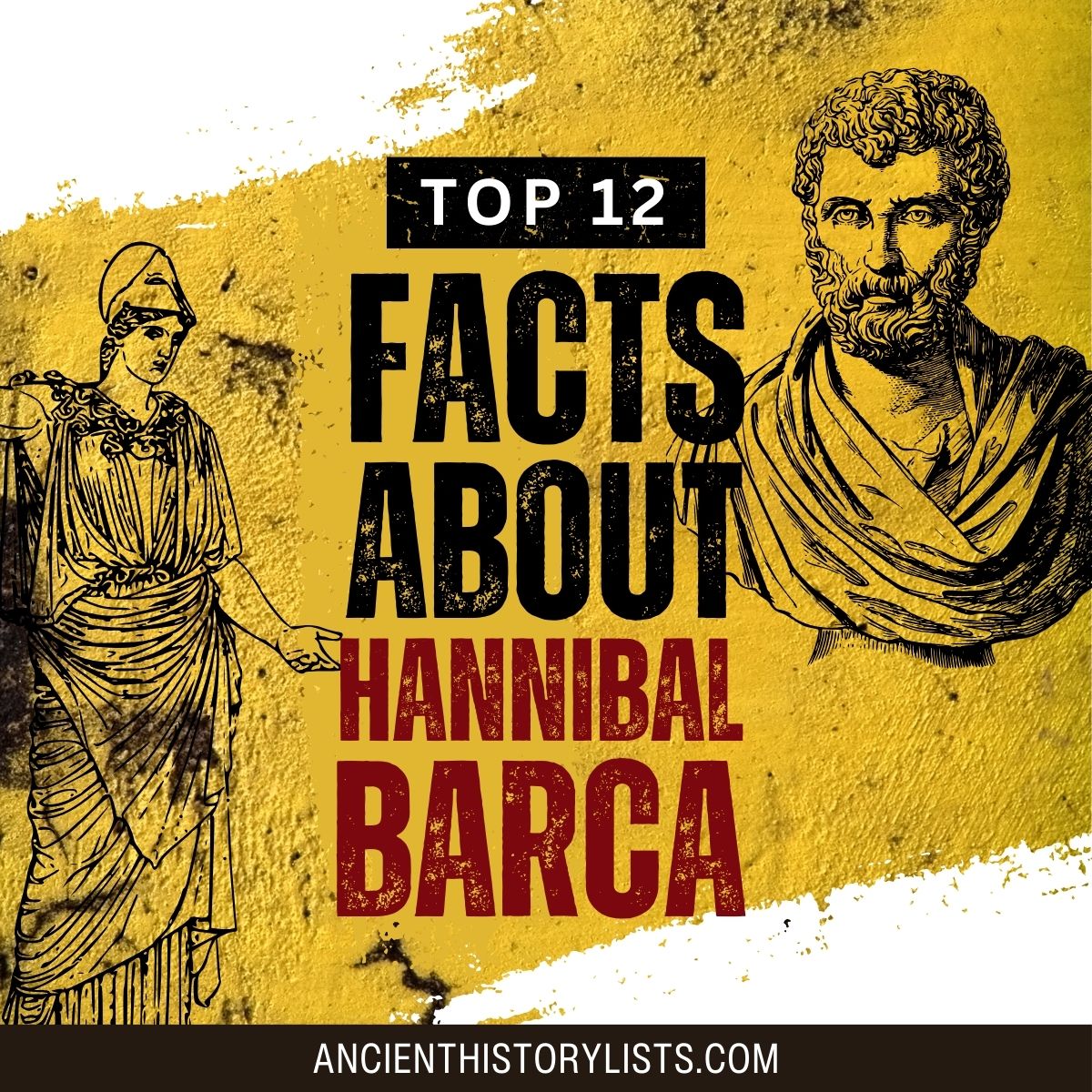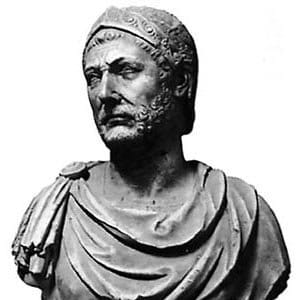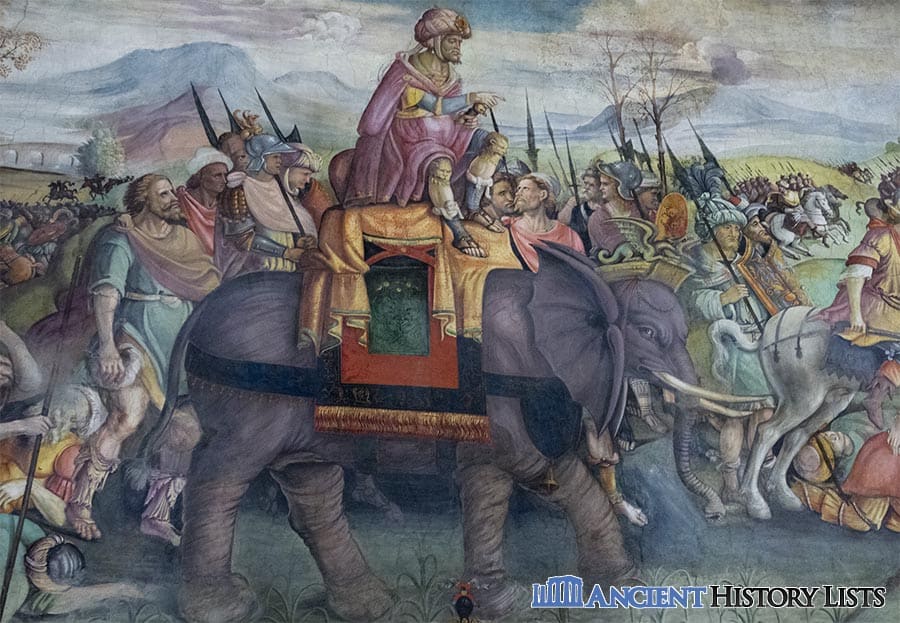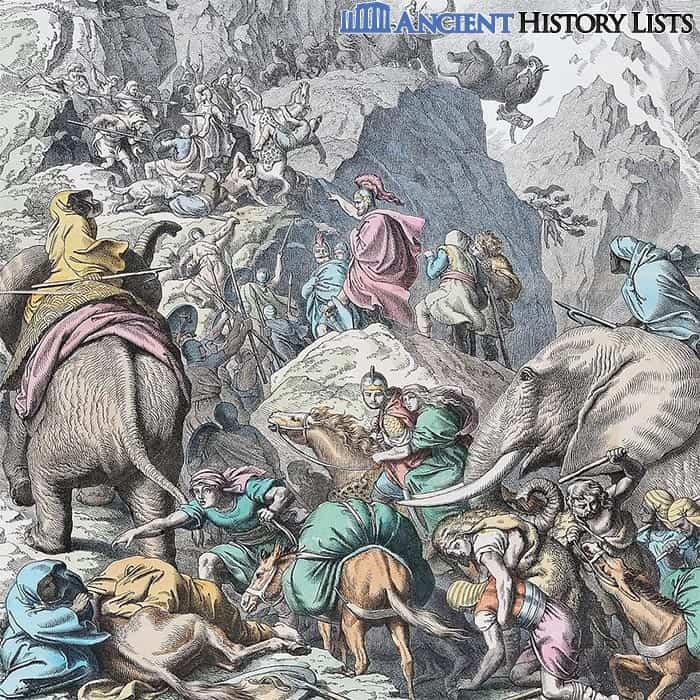Hannibal Barca was a renowned general and statesman. He was known for his skill as a commander and his contributions to the army. He was born in 247 BC to Hamilcar Barca who was also a chief in the Carthaginian army. Mago and Hasdrubal were his younger brothers. All his family members were employed in the army and made major contributions to many wars.
Hannibal was born in Tunisia in the Mediterranean region. His name is of Latin origin and unique in Carthaginian culture. He had a difficult childhood as his father was busily engaged in the Mercenary War.

The situation was made worse when his sisters both became engaged and he lost their support. Hamilcar decided to improve Carthage’s fate after it suffered losses in the First Punic War, and Hannibal supported his father in building a strong army and fighting the Romans.
At the age of nine, Hannibal was introduced to Roman and Carthage rivalry. He was made commander-in-chief of his troops and was given extensive training in the army at the same time.

1. The Roman Enemy
Hannibal’s life was dedicated to fighting the Roman Empire. His father, Hamilcar, introduced him to the Roman wars and trained him in the Carthaginian army. Rome was always a threat to Carthage, and the Barca family fought against them throughout their lives.
When Hamilcar introduced Hannibal to the army, he made him swear to maintain Rome as an enemy. After his father’s death in the Mercenary War, Hannibal decided to fight to earn the lost respect of Carthage, and he traveled to Spain to seek support.
Hannibal Barca soon integrated into the Spanish army, and his efforts paid off in a victory over Rome in the First Punic War. The fire in his heart to defeat Rome was real, and he kept his promise to his father to always fight Rome. His aim to earn respect and freedom for Carthage was also achieved.
2. A Good Education
Hannibal was not only an efficient and capable soldier, but he was also well educated, often proving that the pen is mightier than the sword.
Hannibal was a great scholar, and he learnt from the ancient Greek teachers. While his father taught him everything he needed to know about the military and war, his Greek teachers were the key contributors to his all-round development. Hannibal made literary contributions mainly in the field of military books but was also a keen observer of language, especially Greek, and arithmetic.
He committed many of his great battle plans to paper, and being such a military enthusiast, Barca created a manual for the defense of Rhodes while he was in exile after the Second Punic War.
3. Mysterious Death
Hannibal Barca’s death has remained a mystery, and archeologists and historians have never been able to provide any real details about it. It is believed that Hannibal died in Gebze, Turkey, possibly of a prolonged fever after injuring his finger with a sword while he was mounting his horse. This theory is often disputed though, and many scholars disagree with the story.
Another widely believed cause of death was suicide. It was thought that he poisoned himself in Libyssa. He had a ring with him which was always loaded with poison, and one theory is that he killed himself on the shores of the Sea of Marmara by consuming the poison.
The reason behind his suicide was thought to be his ongoing struggle with the Roman Empire. After the Second Punic War, he was exiled for a long time and had plenty of time to think about his own death. It is thought that this exile and isolation may have led to his suicide.
4. A Great Leader
Hannibal Barca learned to lead from the front. The Punic Wars were the most important evidence of his leadership qualities, and the most famous example of his military excellence was at the Battle of Cannae. His leadership skills and courage enabled his army to win the battle with only a handful of troops against a formidable 60,000-strong enemy.
The Battle of Cannae was considered the bloodiest battle ever fought. Around a quarter of the Roman population was killed, and Hannibal led by example. He left behind a legacy in warfare which is still evident today.
5. Shine to his Name
Hannibal belonged to an aristocratic family, and his surname Barca meant “shine” or “lightning,” a name which he certainly lived up to. Hannibal was the one who earned his family respect even after his defeat in the Punic Wars.
Hannibal’s family and his tribe, the Barcans, were filled with joy on his first victory in the wars. Despite beginning life as the black sheep of the family, Hannibal soon proved them wrong with his courage and skill on the battlefield.
6. Journey to Statesman
Hannibal transformed his life from being a military man to a statesman. With his efficient and strategic brain, his life after the wars was marked by his contributions to the state of Carthage. His plans and policies were unique and efficient, and shone as a new sun in Carthage’s dark sky.
After the Second Punic War, he was appointed as a Carthage magistrate. At that time, Carthage was a backward region which was indebted to Rome. Hannibal brought about a revolution in Carthage’s traditional and obsolete policies, he changed Carthage’s constitution, and took Carthage’s officials in hand.
Hannibal was also a major contributor to Carthage’s prosperity. He soon realized that the city’s debts could be repaid by imposing heavy taxation in the city which had been previously neglected. He also trained some of his army men in agriculture to boost the domestic economy. By 191 BC, Carthage had paid off all its debts in a lump sum.
The Carthaginians applauded Hannibal for such a turnaround in the city’s fate, but once Hannibal’s position as a magistrate expired, he distanced himself from politics because he was weary of Roman influence.
7. Elephant Army

Hannibal had an abundance of elephants in his army, most of which were North African forest elephants. These elephants were smaller than the African savanna elephants and their Asian counterparts.
According to some accounts, Hannibal rode an elephant named Surus, which may have been larger than the others and possibly of Asian origin, though this remains uncertain.
This particular elephant only had one tusk, thus it was named Surus. Hannibal felt an affinity with Surus as the elephant was missing a tusk and Hannibal was missing an eye. Hannibal’s elephants proved fatal to his enemies as they were as efficient as any sword on the battlefield.
8. Hannibal Lost his Eye
Hannibal wore an eye patch after the Battle of the Trebia. This was not shown in statues and or artwork yet is widely agreed by historians to have been the case. After winning the Battle of the Trebia, Hannibal’s army traveled through strange, uninhabited swamp land, made worse by heavy rain.
Many of the men’s feet began to rot from the waterlogged conditions, and in Hannibal it led to an infection in his right eye. He lost his eye which was subsequently buried. This was seen as a symbol of victory for his countrymen and evidence of Hannibal’s courage and fearless attitude.
9. The Alps

Crossing the Alps to fight the Romans was considered one of the greatest acts in military history. Hannibal knew that victory awaited him as his army was stronger than the Roman army on land. With this in mind, he was able to motivate and encourage over 40,000 men to cross the Alps in order to attain this victory.
10. Fabius Maximus
Fabius Maximus was Hannibal Barca’s rival. He successfully trapped Hannibal in a valley, and in order to escape, Hannibal had to perform a miracle. He created an illusionary army by tying bundles of logs to around 2,000 oxen’s horns.
These logs were set on fire, and the oxen were set free, creating chaos and confusion. Convinced he was under attack, Fabius assumed a defensive position, and Hannibal once again came out on top due to his quick thinking and strategic brilliance.
11. Life after War
Hannibal was a disciple of the Greek scholars and enjoyed peace and harmony after the wars. He went to the Seleucid court and became a military scholar but was sent into exile for a long period after his defeat at the Battle of Zama.
The Romans did this because they knew he would seek revenge after such an embarrassing defeat. While in exile, Hannibal followed his passion as a writer where he wrote several books on military strategy. Thus, his life after the war was built on the two pillars of the army and books.
12. Loyal Blood
Loyalty ran in Hannibal’s blood. This loyalty was inspired in him by his father while they were in Spain where he was taught loyalty towards his homeland, Carthage. Similarly, Hannibal imparted this loyalty to the army he led.
Though his troops belonged to different areas, cultures, and customs, he was still able to inspire them to follow him. His troops were devoted to him, they responded well to his orders, and they had no thoughts of betrayal towards him. This loyalty was a major contribution to his success in battle.
Conclusion
Hannibal Barca belonged to a family whose legacy was marked by its military achievements, and Hannibal was able to continue this legacy with the respect he earned during his lifetime.
He was amongst the greatest commanders-in-chief, not only for his victories but also for his attitude and bravery. His strategic methods and intelligence earned him the title of “the father of strategy.”
Hamilcar, his father, taught him to respect to his country, and this loyalty made Hannibal one of the greatest threats the Roman Empire had ever seen. He played a vital role in the battles of Trebia and Lake Trasimene, and the Punic Wars.
His education and intelligence spanned the areas of war and politics, and his optimistic attitude to life shone through in both these areas. This is why his death by suicide remains such a mystery.
Hannibal was a great general because he employed successful tactics used by previous generals. The double envelopment he employed at Cannae was used at the battle of Marathon a century before. Most of his success came from facing arrogant Roman statesmen rather than seasoned generals. Once Hannibal faced a skilled roman general his army was soundly defeated at Zama. I don’t wish to belittle his genius but to understand and draw meaning out of history requires a less 2 dimensional approach. Delve into Polibius and Livy and you’ll find a fuller and much more rewarding view of the incredible events of which we are the sum. Please don’t quit.
Great Comments from everyone, Hannibal was a genius like Alexander the Great, imagine if Hannibal had Scipio”s army?
Scipio learned from Hannibal. Scipio could never achieve what he did if it wasn’t for Hannibal.
Remember his own men turned on him and he was tired, never lost a battle for 11 years on Italian soil.
Had scipio fought him head on in the peak of his stay in Italy ,scipio would have been anialated.
And one on one Hannibal was a freak swordsman and warrior. Always took charge in battle , never stood back, that’s why he earned the name lightning.
Um. . .Hannibal never taught Scipio how to make elephants useless. That Scipio could “never” have defeated hannibal etc. is a bit silly, I think, how could anyone know such a thing. Also, Hannibal’s forces were not really undefeated in Italy it’s just that they were never destroyed. Scipio the elder won an early cavalry engagement in 218 and a slave army made up of Cannae survivors had success too–let’s not forget Fabius’ strategic victories.
Hannibal was able to keep his forces together for 14 years or so by avoiding battles that didn’t favor him outright (I must admit Cannae was insane!). He went 14 years fighting like 4 major battles–no wait, those battles were all fought between 218 and 215 he went 11 of those years without any major victories.
Hannibal’s men never turned on him. Scipio was the vastly superior general to Hannibal: his plans were richer in strategy and nuanced tactical brilliance. Hannibal was essentially useless without a cavalry advantage as Zama clearly illustrated.
ChrisL,
Having the same initials I very nearly thought I sleep-typed your response. Marathon, Zama, Livy and polybious are the exact points i would have made. Hannibal and Scipio were great battlefield commanders BECAUSE they knew their history and modified that knowledge to suit the present.
Personal history about Hannibal is almost entirely prose from Livy-Hannibal being a freak swordsman is not information gleaned from any primary source (There really aren’t any) so that one is just hooey. At Zama, according to actual sources, Hannibal had his forces replenished save for the legendary Numidian cavalry (Scipio forced them to fight for the Romans). He also was given 80 elephants that Scipio the younger handled easily with a bit of planning. Hannibal was soundly defeated because Scipio chose the battlefield; an honor Hannibal had heretofore enjoyed. Hannibal knew how to slap armored Roman politicians around but he had 0 success against shrewd battle commanders like Quintus Fabius and Cornelius Scipio the younger (Africanus the elder).
In Italy, 100,000 Roman farmers against 35,000 trained mercenaries is a feat to revere, but let’s not go crazy. And as for one on one? According to Livy, Hannibal had his chance, he used it to beg Scipio to leave the field–of course, Livy was born 150 years later and did not cite any lost sources.
If he was born in Africa why does he have white features. He was an African not European.
Thanks
He was born in North Africa, Carthage, Tunisia, which is along the Mediterranean coast. Climate-wise it isn’t much different than Rome, Athens, Barcelona, etc. Furthermore, his father was born in Spain and the Barca family were Phoenicians (modern-day Lebanese people). Do a simple Google search of “Phoenician art” and you’ll see how they depicted themselves as appearing.
Being born in Africa doesn’t make you Black or make you look “African.” By your logic, the actress Charlize Theron should look “African” since she was born in South Africa. The Carthaginians were Phoenician colonists in a coastal city in North Africa that is closer in distance to Rome than it is to 97% of the African continent.
Maybe because it’s North Africa, not sub-Saharan Africa. Maybe he was a Berber?
The Romans called their wars with the Carthaginians “the Punic wars”. The word “Punic” is a derivative of “Peoni or pheonii” (phoenician) because Carthage was founded by semitic tribes from the near east. This was true with much of the ancient north coast of Africa.
One other small point; prejudice in classical antiquity was not based on skin color but culture, more specifically, language.
is there an accurate rendering of Hannibal. Also I wonder if he used African elephants since now a days I don’t think they are domesticated
If you take a trip to North Africa you will notice the resemblance of the people being more European than the Black Africans you are thinking of. Asia covers a huge area too, nevertheless, it’s people look totally different from region to region. BTW, Hannibal’s father was from Spain. A large number of DNA tests done on North Africans, proves a direct blood link to Southern Europeans.
Hannibal NEVER took a head up defeat with one eye from being stung in it traveling to Rome, and leading the frontline like no other general. Scipio Africanus won a war by being a coward not giving us the face 2 face war we wanted but going into Carthage burning our children and wives thats when our people turned on us and Hannibal fled and became military advisor for other nations until taking a offer to become Sufette(Judge & King) of Carthage. Hearing of the romans wanting revenge when he was 65 instead of facing him in his prime forced him to take poison instead of torment In 182 B.C believing in reincarnation under the alter of Baal(Ball) meaning Lord. Every person who tell this story some how try to make Rome look good and superior in those times instead of the pirates an thieves they were robbing our ships. Carthage was the super power in those days controlling all resources of the Mediterranean with seaports in Carthage, spain, and our head seaport in Sicily that the Romans attacked first when they came out of their underground caves in Hamlicar Barca’s time starting the 1st punic wars…valuable info OF WHAT THE WARS WAS OVER IS ALWAYS LEFT OUT. The roman empire was our empire until they robbed us for our resources and made replicas of our ships in Sicily to become the super power they are today. If we would of finished Rome off instead of retreating to Carthage to save our wives and children that were already doomed we would be the super power we always were. If you got a sword to the devils throat and one of his demons got a sword to yo sons throat what do you do? Retreat to save your son to witness the sword slit his throat while the devil throw a spear through your back and suffer 2 losses, or sacrifice your son slit the devils throat and save all humanity and have another son? Option number 2 of having a heart that Scipio could attack was the only loss Hannibal took. Im glad to carry his name because Hannibal made history over the Barca name so we carry Hannibal over Barca and blessed to carry his last 4 digits born 7/1/82 as Jayru Hannibal as his reincarnation his birthday 247-182 B.C…Salute the
Hannibal was perhaps the greatest general of the ancient world. The conquests he achieved with the men he had, with the power he had in regards to his country’s political system, and how having to gel different ethnicities to work together are all signs of a truly great general. He led by example. When his army was crossing the alps he endured the same as his soldiers. He may not have had ultimate success but ultimate success isn’t the defining mark of the greatest general.